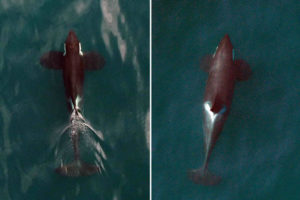On the heels of Orca Awareness month in the Pacific Northwest, the Department of Fisheries and Oceans (DFO) has opened a platform for feedback on its scientific review of the effectiveness of recovery measures for southern resident killer whales (SRKW).

Two northern resident killer whales photographed by a remote-controlled hexacopter from 100 feet. The whale on the left is in very poor condition and is thought to have recently perished. The whale on the right is healthy and in the prime of his life. Scientists are using the hexacopter as a cost-effective and non-intrusive method for monitoring the health of killer whales. Photo credit: NOAA, Vancouver Aquarium.
DFO is seeking public input until July 31 to identify how recovery can be better achieved by accelerating implementation of recovery measures not yet underway; by identifying new measures, if needed; and by providing guidance on the priority of recovery measures to promote recovery.
Georgia Strait Alliance is advocating for a number of actions to be implemented immediately to ensure southern residents have the best chance at true recovery. These are divided into the three main threats to orcas: salmon abundance, noise pollution and toxins.
Please select a few actions that you think will help orcas recover, and email your input directly to DFO.
To mitigate the threat of low Chinook salmon abundance and availability, look for:
- Implementation of temporary strategic closures of Chinook fisheries in areas that support SRKWs, especially for Chinook stocks that spawn in the Fraser and Columbia Rivers.
- Funding for the restoration of salmon spawning habitat through the removal of obsolete dams on the rivers, re-planting of forests that have been cleared to the foreshore, and eliminating sources of sewage dumping into the waterways.
- Allocation of a portion of the Chinook salmon stock to SRKWs and other marine predators in the fisheries management plan.
- Reducing the allowable amount of Chinook bi-catch in other fisheries.
- Assessment of the population abundance and availability of the fish that Chinook eat, especially herring, and implementation of any changes needed to protect these stocks to ensure that Chinook have access to the food they need to recover.
- Transitioning from open net cage fish farms to closed containment facilities that are on land.
